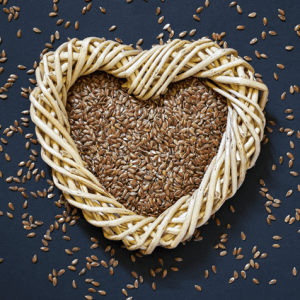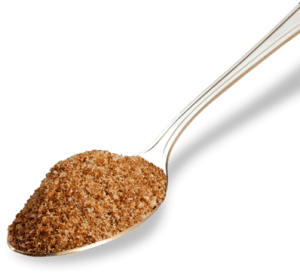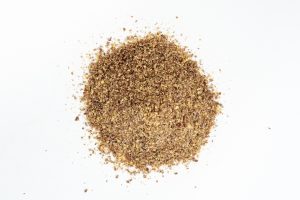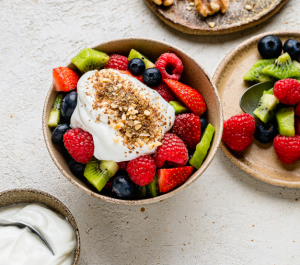In this article from Linwoods, Jane McClenaghan (BScHons, DipION and BANT registered Nutritional Therapist), discusses the positive impact of flaxseed in your diet to help bowel movement, flare-ups and bowel health. [Sponsored content]
Flaxseed has long been used as a gentle and natural relief for constipation, but we have since discovered that it has a whole host of other benefits for bowel health. Here are six reasons for including flaxseed in your daily diet, with some hot tips to help you get it right.
- Flaxseed for fibre

One of the reasons why flaxseed is so good for our gut is thanks to its high fibre content. A lovely source of both soluble and insoluble fibre, it is a great addition for digestive support. Most of us struggle to get the daily recommended fibre intake of 30g. Flaxseed is a great way to add a big boost of fibre to your diet. Just one tablespoon (a 20g serving ) will hit your diet with 5g of the stuff. (1)
Hot tip no. 1 – add a tablespoon of milled flaxseed to your daily diet. Try it on breakfast, added to soups or baked into healthy muffins or snacks.
- A natural laxative
Flaxseed contains a particular type of fibre that can soften the stool and act as a natural laxative to help relieve constipation. This mucilage fibre forms a gel when combined with water to help keep things soft and moving well (2)
Hot tip no 2. – have a glass of water or herbal tea with any meals containing milled flaxseed to help maximise the beneficial soluble fibre effects.
- Soothes and calms

The mucilage fibre we heard about above is thought to help support and protect the lining of our gut, helping to soothe mucus membranes and reduce irritation.
However, it is recommended that flaxseed is not taken during a flare-up of IBD as this can exacerbate symptoms in some people, so take it easy. (3)
Hot tip no. 3 – start slowly and build up gradually. Start with a teaspoonful of milled flaxseed every other day and build up slowly to see if it works for you.
- Whole, milled or flaxseed oil?

Put it like this – whole flaxseed will come out the way it goes in. It cannot be broken down in our digestive tract, so is of little benefit to digestion. A better way to consume your daily flaxseed is in its milled form. This way the little seed has been cracked open to allow your body to access all the nutrition it contains, including the soluble fibre. Some people take flaxseed oil, but taken this way you will miss out on so much nutrition that flaxseed has to offer.
Hot tip no. 4 – consume flaxseed in its milled form for optimal benefits.
- Friendly for your microbiome

We have heard all the talk about probiotics and how important these friendly bacteria are for our health, far beyond our digestive tract. Flaxseeds have been shown to help support a healthy balance of the goodies in our gut microbiome, supporting levels of probiotic bacteria like the Lactobacillus species, Bifidobacteria family as well as less well known species like Akkermansia, which is an important bug to help support mucus production for a healthy gut lining. (4,5)
Hot tip no. 5 – add flaxseed to a probiotic yoghurt for a double whammy, you’ll get a prebiotic (flaxseed) and a probiotic in one hit.
- A low FODMAP fibre
If you are following a low FODMAP diet, you might be struggling to get enough fibre. Adding some flaxseed to your diet can help. Just remember to start slowly and build your levels up if you are not used to having flax in your diet.
Hot tip no. 6 – flaxseed crackers are a great addition to a low FODMAP diet and will help increase interest and variety. You’ll find lots of great recipes online here: www.linwoodshealthfoods.com.
Jane McClenaghan BScHons, DipION
BANT registered Nutritional Therapist
References:
- https://linwoodshealthfoods.com/product/milled-organic-flaxseed/
- Goyal A, Sharma V, Upadhyay N, Gill S, Sihag M. Flax and flaxseed oil: an ancient medicine & modern functional food. J Food Sci Technol. 2014 Sep;51(9):1633-53. doi: 10.1007/s13197-013-1247-9. Epub 2014 Jan 10. PMID: 25190822; PMCID: PMC4152533
- Palla AH, Gilani AU, Bashir S, Ur Rehman N. Multiple Mechanisms of Flaxseed: Effectiveness in Inflammatory Bowel Disease. Evid Based Complement Alternat Med. 2020 Jul 12;2020:7974835. doi: 10.1155/2020/7974835. PMID: 32765633; PMCID: PMC7374215.
- Brahe LK, et al. Dietary modulation of the gut microbiota – a randomised controlled trial in obese postmenopausal women. Br J Nutr. 2015 Jul 2:1-12
- https://atlasbiomed.com/blog/what-is-akkermansia/
- https://centerforfunctionalmedicine.com/wp-content/uploads/2016/10/Overview-of-the-Low-FODMAP-Diet_BRFINAL.pdf
This article from Linwoods is published by Bladder & Bowel UK as part of a promotional agreement.
Get in touch with us
Bladder & Bowel UK have information about a wide range of bladder and bowel conditions for children and for adults on our website. For free confidential advice and support please contact our helpline via the webform or on phone number 0161 214 4591.



Comments are closed